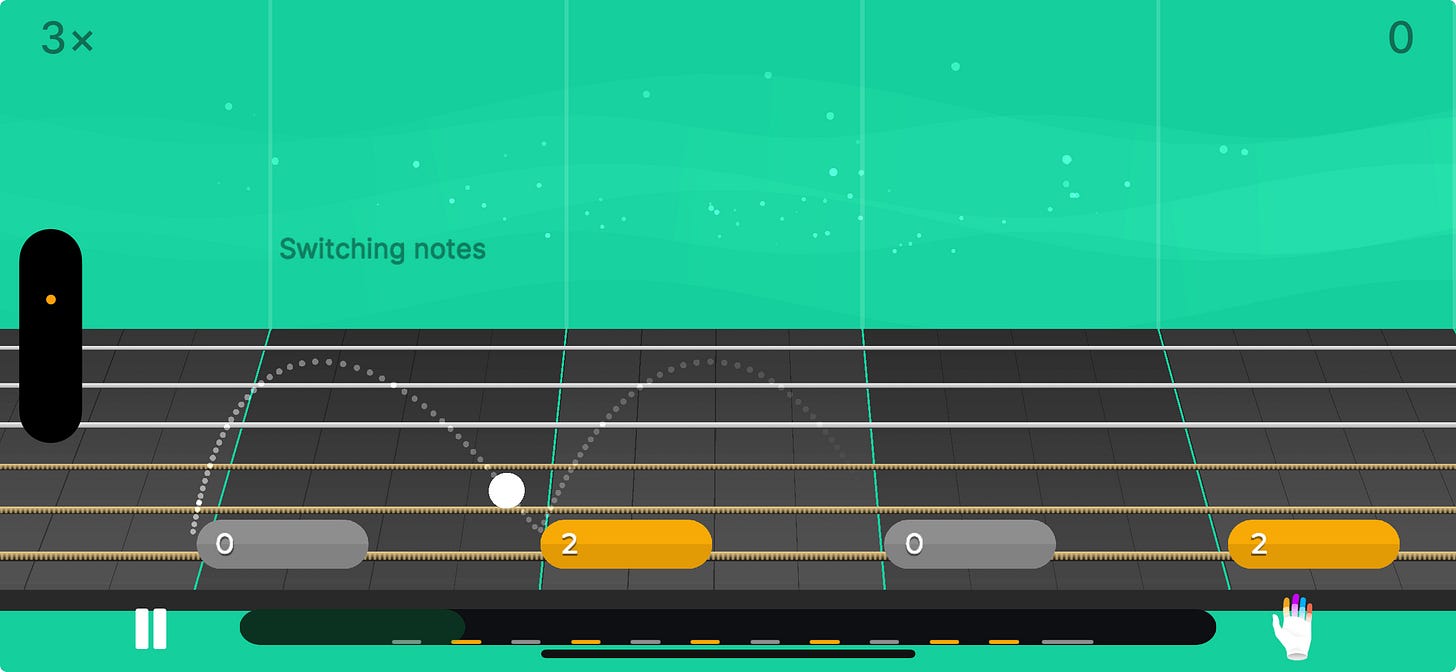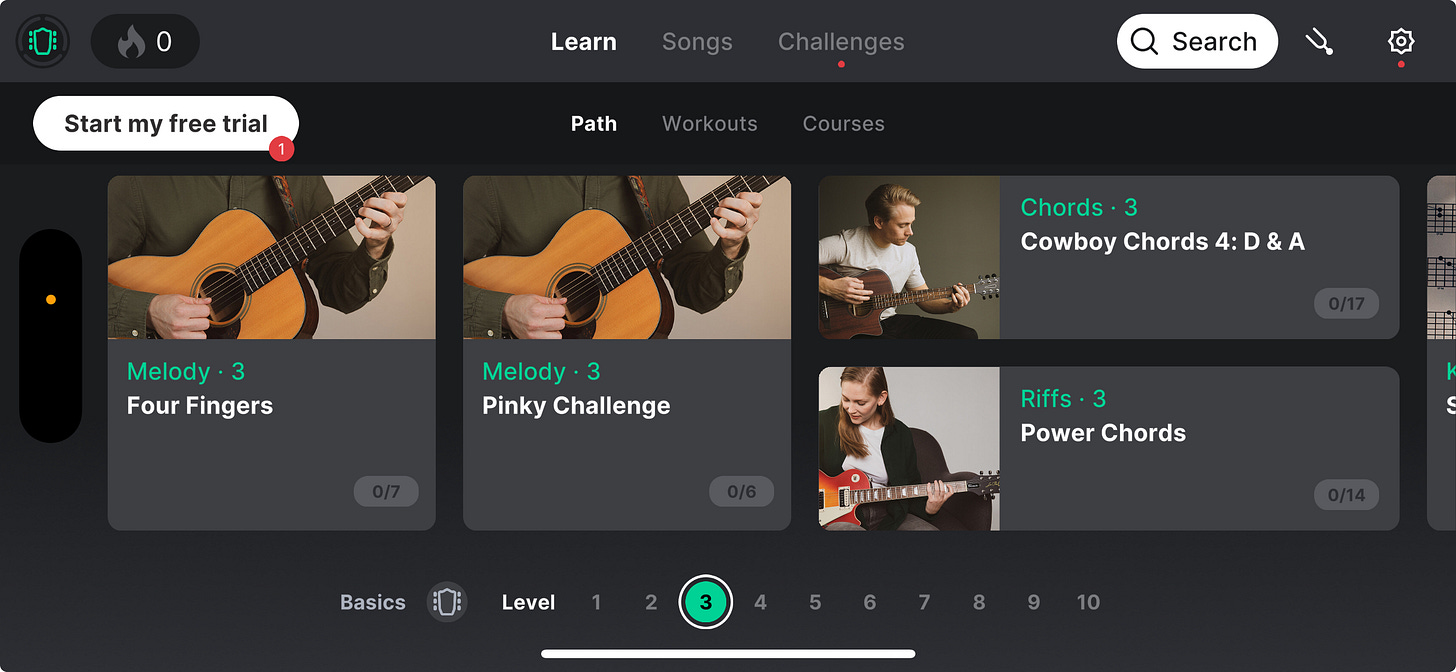So, You Want to Be a Rockstar? A Conversation with Hadley Spanier
Hadley Spanier leads artist partnerships and industry relations at Yousician, the world's leading musical education platform. We spoke about what music education looks like in the 21st century.
I started guitar lessons in sixth grade at my local music shop with a guy named Mike. Mike was a horrible guitar teacher. Each time I started playing a song, he would rip a solo. When you’re a novice, that makes learning almost impossible. I still loved the guitar, so I asked this kid from school who played who taught him. He gave me the phone number for a guy name Ande. Ande came to my house a few weeks later, and it changed my life. He not only became my teacher, but he soon became my friend. He’s not only one of the biggest reasons why I still make music, but he’s also played an indirect role in me working in music and writing this newsletter.
Sadly, not everyone has an Ande in their life. Yousician is trying to change that. Yousician is an interactive music education service that allows people to learn guitar, bass, ukulele, piano, and voice at their own pace. I connected with Hadley Spanier, the Global Head of Artist Partnerships and Industry Relations for Yousician and its sister product GuitarTuna, to understand why they’ve made learning an instrument like a game, how musicality is as important as literacy, and what’s replaced “Smoke on the Water” as the most common song for beginners to learn.
A Conversation with Hadley Spanier
Yousician is one of the world’s leading music education platforms. Before I ask you questions about the platform, can you tell me what Yousician’s musical education philosophy is?
The mission of the company, which has been in existence now for 14 years, is to make musicality as common as literacy. Our founders created this product because they had a personal need. They wanted to learn how to play a musical instrument, and they weren't finding tools that were helping them do that. Given the success of the product, this was clearly an issue for others as well. We want to be a resource for people who don’t have an in-person teacher. We also want to make learning feel fun and exciting, almost like you are playing a video game.
That gamification is something that struck me when I was using the app. It almost felt like I was using an app that exists somewhere between Guitar Hero, Angry Birds, and Duolingo.
I actually describe it similarly sometimes. Yousician is like Guitar Hero, but you are actually learning how to play.
So, clearly making learning feel like a game is important to you?
There’s a balance we have to strike. We want it to feel fun and engaging, but we also want to make sure that you're actually learning how to play. We have a team of music educators in Helsinki that are creating the syllabus and exercises to make sure that our users are really learning how to play. The fun, gamified aspect is what keeps people coming back, though. You need that to build habit. Habit is necessary for learning any new skill, whether that be a language, an instrument, or anything else.
Having known many novice guitarists over the years, the place I find where most people drop off is when they have to learn barre chords. Where do you guys see people most frequently stall in their learning? How have you worked to get them past that?
I think we typically see that the biggest barriers for people are time-based rather than skill-based. Our drop off points are similar to any app that asks a user to log on day-after-day. Our biggest challenge is making you want to come back repeatedly. That’s a bigger challenge than anything musical. We’ve found that artist partnerships and a vast song library are two things that will make users come back more regularly.
Let’s hit on both of those things. First, partnerships. Over the last few years, you've worked with some prominent artists, including Metallica and Billie Eilish. Can you talk to me about how some of those partnerships emerged, and how you've seen them engage users?
I came to Yousician in January 2020 from Verve to focus on brand marketing. I immediately identified a lot of opportunities for the company to work directly with artists beyond just licensing their music to our platform. Our first partnerships emerged during the onset of the pandemic when schools moved to remote instruction. We made it free for music teachers and students to join the platform. Then we established some artist partnerships to keep students engaged. Those artists would join Zoom classes and listen to students play and then play songs for them.
The first partnership of that nature was with Jason Mraz. The reason for that is that his song “I’m Yours” is one of the most popular songs new students learn on guitar or ukulele. From there, we did a partnership with Juanes and Duolingo. After that, we worked with Metallica. Now, we are doing one with Billie Eilish. Typically, we focus on partnerships with artists that our users are interested in. We also stress to artists that when they have kids learning their songs, it creates a deeper fan connection.
You said the other driver of user retention is catalog. I presume that Yousician has to license the songs available on the app. How does that work? Do you pay out both performance and mechanical royalties? Also, how do you focus on which songs to license?
We have licenses in place covering the majority of popular music. Chase Smiegiel leads licensing for us after having previously worked in licensing at Spotify. Even with our robust set of licenses in place, the use of music on our products sometimes requires another layer of direct approvals from high profile artists. To date, we have been successful gaining support from these artists around our mission of musicality and music education, including Madonna, Nirvana, and many others.
And those big name artists are typically what people are looking for. What’s great about artist partnerships is that we can go deeper into the artist’s catalog. With Billie Eilish, we added 30 of her songs to the platform, including her entire new album.
I’m sure her and her team also view that as a marketing opportunity for the new record.
Yes.
When you mentioned Jason Mraz before, you said that his song “I’m Yours” is one of the most popular songs for new students. When I started taking lessons, the default song to start with was “Good Riddance (Time of Your Life)” by Green Day. I know decades before that, it was “Smoke on the Water”. What other songs are popular with new students these days?
Some of the most popular artists our users are looking for are Metallica, Coldplay, Nirvana and Green Day. We also have a lot of interest in major popular artists like Billie Eilish, Ed Sheeran, Olivia Rodrigo and Taylor Swift.
Earlier you mentioned that before coming to Yousician, you worked at Verve Label Group where you oversaw millions of dollars in marketing spend. In what ways did that role prepare you for this job?
I think every industry is rooted in relationships, but the music industry is especially so. Given my time working for labels and management companies, I had a lot of experience managing people, along with facilitating relationships with artists and their teams. When you're creating partnerships and negotiating deals, you need to have the ability to delicately balance artist needs and business needs. I navigate that daily.
Do you play any instruments?
No, I always tell people I am in the music business, and I really stress the business part of that phrase. I did take piano lessons as a kid, but I was much more into soccer.
In what ways do you think not being a musician helps you in your work at Yousician?
It’s a huge asset. I am the target audience. Most of our users are people coming to an instrument for the first time. That’s me every time I open our products. It also gives me a more detached perspective, which I believe is helpful.
Of course, when you work at a music company, you work with people who are incredibly passionate about and experienced with music. But the general population doesn’t experience music in the same way that they do. So many people in the business have their offices equipped with really high-quality audio systems, which they either need to do their jobs or just simply enjoy. But that’s not how most people in the world consume music. Your average person is either listening through headphones or the tiny speaker in their phone. There’s value in experiencing music like most of your actual fans.
My buddy and I that make music together always joke that if a mix doesn’t sound good coming out of an iPhone, it doesn’t matter if it sounds good coming out of a $5,000 HiFi.
Exactly.
Let’s turn to Yousician’s user base. For a long time, the guitar was a very male-coded instrument. But over the last decade, we’ve seen an influx of women playing. What’s the gender breakdown of students on Yousician?







